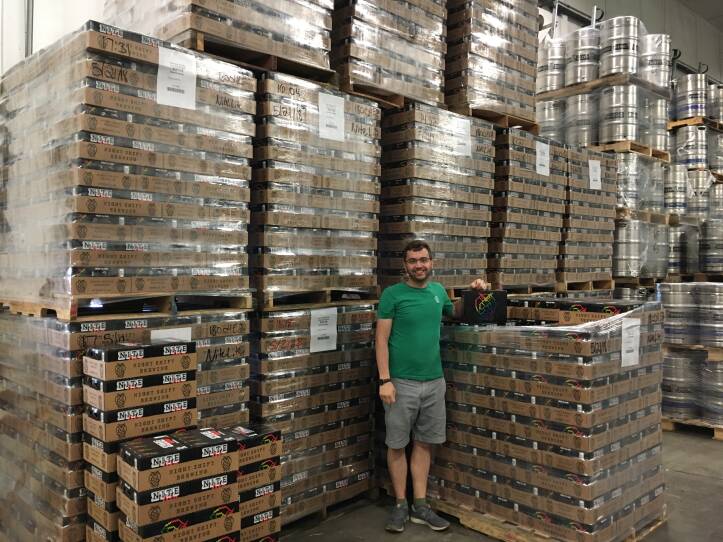Inside a huge industrial building in Franklin, there are 120 conveyor belts designed to carry broken glass to three stories of giant machines that crush the glass and sort it, to be sent away and be made into new bottles.
But those machines aren't running now.
"I think the plant operated at approximately 80 decibels — glass is banging, machines are running. Yeah it was it was pretty loud here,” said Andrew Crowley of Strategic Materials, which owns the plant. Today the plant almost silent inside. “It's kind of sad, it being so quiet," he said.
The plant closed last month because it lost its only big customer — a company called Ardagh, which ran a plant just nine miles away in Milford that turned all that glass back into bottles. That closed down in March. 250 people worked there.
"There are no glass bottlers in New England anymore,” Crowley said. “There is no one making bottles in New England."

Outside the Franklin recycling plant is a 70-foot-deep pile of broken, five-cent deposit beer bottles. The glass will be trucked to Connecticut, separated by color, and sent by rail to bottlers in Virginia, Florida or North Carolina. But no glass from all of the blue and green recycling bins used in Massachusetts is being turned into bottles anymore.
In a statement, the company that ran the Milford bottling plant blamed the closure on a decline in demand from the beer industry.
Rob Burns, president of Night Shift Brewing in Everett and president of the Massachusetts Brewers Guild, says about 10 years ago, canned beer was viewed as bad or cheap. But not anymore. "Light doesn't get into the product, and the seam on the cans are tighter, which allows less oxygen to interact with the beer so the beer stays fresher longer,” he said. So more breweries are skipping bottles.
But there’s still plenty of glass that needs to be disposed of, and there's no perfect option for getting rid of it.

After the bottle plant closed, Massachusetts communities and their waste haulers started requesting waivers from the state Department of Environmental Protection to allow them to use landfills for glass. From February to May, the state’s two biggest waste haulers dumped nearly 11,000 tons of glass in landfills. Since then, about 2,000 more tons have been dumped.
But they’ve been looking for other options, and now most of the glass we put in recycling bins is winding up in a massive pile in Raynham, where large machines grind it up.
"It looks like a mess but it comes out pretty good," said Chris Carney, whose company Carney Environmental is getting glass from about 50 towns. Carney said they have ground up 15,000 tons of it into sand. "I take the sand and mix it with asphalt brick and concrete and aggregates and use it for road-based materials," he said.
Carney gives that material away for paving projects, because he makes his money on the other end — charging cities and towns about $85 per ton to take the glass off their hands. That’s a strain for some towns, since they used to pay about 20 dollars per ton for recycling.

Greg Cooper, deputy director of consumer programs at the Massachusetts Department of Environmental Protection, said the state is trying to help communities buy their own equipment to grind up glass, to lower their costs.
“We’re providing grants and assistance to both municipalities and to the recycling industry to kind of improve their glass processing, improve product, and develop new products and new markets for that recovered glass,” Cooper said.
Some, like Kirstie Pecci, director of the Zero Waste Project at the Conservation Law Foundation, say grinding glass into sand is wasteful and inefficient. The best-case scenario, Pecci said, would be just reusing bottles. Second would be recycling glass to make new ones.
“In this case, we’re handling the disposal problem, which is a really good interim solution,” Pecci said. “But we are losing all the value of the energy, the resources, the water. Everything it took to harvest the raw materials, make glass out of them, and then make that glass into a bottle.”
For now, though, she said it’s important for people to keep putting glass in their recycling bins, even if it’s going to be ground up, because that’s better than filling up landfills. And she’s optimistic new customers will come along, and glass recycling will bounce back.





